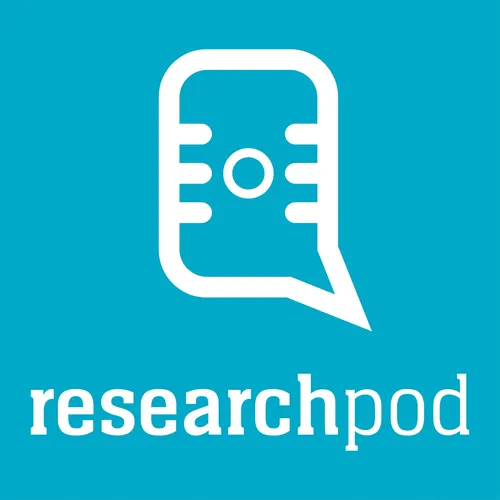
ResearchPod
ResearchPod science podcasts connect the research community to a global audience of peers and the public, raising visibility and impact. www.researchpod.org. All content is shared under the Creative Commons CCBY-NC-ND 4.0 licence. For further information, email [email protected]
- Update frequency
- every 3 days
- Average duration
- 18 minutes
- Episodes
- 486
- Years Active
- 2019 - 2025

Lifting the Resource Curse
The 'resource curse’, or "Dutch disease“, describes when countries rich in natural resources face reduced domestic growth rates in other sectors due an influx of foreign currency or investment, mixe…

Cameleer: A deductive verification tool for OCaml
How do we know that we can trust software? One answer is software reliability testing.
Dr Mário Pereira and Dr António Ravara from the Nova School of Science and Technology in Lisbon, Portugal, and t…

Managing Balance: Sustainability in science and history
Alchemy may be understood as the first scientific paradigm, beginning as a collection of observations, experiments, and recipes for practical processes. Woven into these primary alchemical texts were…

Can β-glucan soluble fibre from oats and barley affect weight loss and adiposity?
Obesity is a growing public health concern, but studies suggest that soluble fibre from certain cereal whole grains can help weight management.
Rebecca Mathews and her collaborators in the US conduct…

Quantum carpets from tumbling molecules
Molecules are comprised of charged particles whose spatial distribution is or could be distorted, lending the molecules a handle by which they can be manipulated via external electromagnetic fields.
…

How can we reduce the public health burden of food and waterborne diseases?
While some bacteria are beneficial, such as probiotic bacteria in the human gastrointestinal tract, others can have serious consequences for human health.
Professor Aliyar Cyrus Fouladkhah of Tennes…

The Future Circular Collider
New generations of particle accelerators are now in development, in which beams of particles collide ever more precisely and at ever higher energies.
Professor Stephen Myers, former Director of Accele…

New therapeutic avenues for treating Alzheimer’s disease
Dr Bradlee Heckmann and his team at the USF Health Neuroscience Institute in the US aim to develop new therapeutic avenues for treating neuroinflammatory and neurodegenerative diseases, including Alz…

Alternative financial engineering to fund our health - The WHO Case
A healthcare system that is preventative, collective and inclusive is far more resilient, and cheaper to run, than private for-profit schemes. Such a preventative system will be much cheaper to inve…

Searching for inefficiencies in the food–energy–water nexus
The WASTE FEW ULL project is developing and testing internationally applicable methods of identifying inefficiencies in a city-region’s food-energy-water nexus.
It is achieving this goal through an i…

Industry incentives and antibiotic resistance
In the face of increasing drug resistance, there is a pressing need to develop new antibiotic compounds. However, the effort of developing such new treatments can go unrewarded, so long as there are …

How intestinal bacteria use our dying cells as fuel
Until now, a great deal has remained unknown about the relationship between programmed cell death and bacterial infections. However, recent work by Dr CJ Anderson and Professor Kodi Ravichandran from…

The next big thing: A Monetary Inflation Brake
How should we design a new monetary tool that can cope with external shocks which might affect our economy in the Anthropocene?
The Tao of Finance initiative from the World Academy of Arts and Scienc…

Genome Architecture Theory shakes up cancer research
Dr Henry Heng’s Genome Architecture Theory is a new paradigm questioning the status quo of genomic and evolutionary theories. He proposes that cancerous cells are so different in their genome archite…

Food consumption, gender and body types in children's animations
Today's cartoons a different experience from past generations, in which gratuitous violence was the primary concern of worried parents. But what if what they showed was more surreptitious in its infl…

New theories expand cognition to fungi
Consciousness and self awareness are tricky things to define in an all-encompassing way, and new research on the intricacies of cellular cognition is reshaping how we think about microorganisms and o…

Optimizing future well-being with artificial intelligence
By leveraging your personal health data with Artificial Intelligence, from blood samples to psychological surveys, it is possible to make accurate predictions on biological age and interventions to …

K-MEDI Hub: Pioneering preclinical research
A state-of-the-art research and development centre in Daegu, Korea – K-MEDI hub – is creating a medical industry ecosystem for the research and development of new drugs and medical devices.
At its Pr…

The neuroscience of metabolism
An estimated 130 million adults are living with diabetes or prediabetes in the United States right now. So it might come as a shock that a fundamental concept of diabetes - that the condition is root…

Can deeply religious people be intellectually humble?
Is theism conducive to humility in thought? Can deeply religious people also be intellectually humble?
Dr Peter C Hill, professor of psychology at the Rosemead School of Psychology based at Biola Uni…